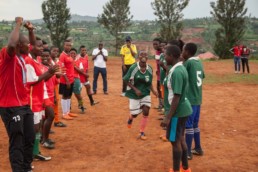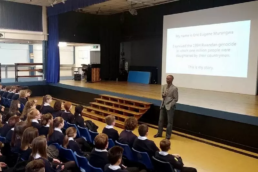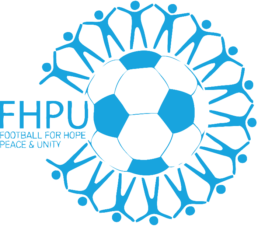ABOUT US
OUR VISION
The Ishami Foundation draws on genocide survivor experience to help us all connect to our common humanity.
Many of our team survived the 1994 genocide against the Tutsi in Rwanda. Having lived through discrimination, social polarisation and violence, we the survivors understand the importance of peace and tolerance in our societies. We are committed to helping communities in Rwanda and the UK learn from our experiences.
We currently focus on communicating the lessons of the past through two strands of activity: sport and storytelling.
OUR GOALS
The Ishami Foundation uses the power of sport and storytelling to build equality, tolerance and lasting peace in Rwanda and the UK.
We work with survivors, young people and vulnerable communities. Our activities empower participants by fostering respect, team spirit, critical thinking and resilience.

We use SPORT…
…especially football, to empower young people, foster tolerance, teamwork, critical thinking and active citizenship.
We do this by coaching and convening matches, predominantly for young people, of all genders, drawing on our sport for social change model. During these activities we take time to remember the victims of genocide.

We use STORYTELLING…
…especially genocide survivor testimony, to preserve the memory of the 1994 genocide against the Tutsi in Rwanda and other modern genocides.
We reach young people and the wider public through survivor talks at schools, universities and community events. We also support the survivors who are bearing witness to their experiences.
In addition, we remember the victims of genocide, communicate the dangers of division and promote tolerance to wider audiences through a range of materials and art forms. And we seek to work in partnership with other organisations who share our aims.
OUR HISTORY
Our charity was founded by Eric Murangwa Eugene MBE. In 1994 Murangwa was a goalkeeper for the renowned Rayon Sports Football Club in Rwanda. He and most of his immediate family survived the genocide against the Tutsi in part thanks to the courage and humanity shown by his teammates. As a result, he became convinced that sport and storytelling have the power to influence society in a way that little else does.
“Ishami” is a Kinyarwanda word meaning branch, symbolising resilience, recovery and connection. The Ishami Foundation brings together two of Eric’s organisations: Survivors Tribune and Football for Hope, Peace and Unity.
Survivors Tribune was an educational initiative founded by Eric and Jo Ingabire Moys in 2015 to support and enable survivors of modern genocides to share their experiences through public speaking in schools, colleges, universities and the wider community. It drew on the idea that through speaking, survivors are empowered in the process of empowering future generations.
Football for Hope, Peace and Unity was an organisation dedicated to using football to bring young people together and promote community reconciliation in the UK and Rwanda. FHPU used football for peace training to encourage team work, develop conflict resolution skills and fight prejudice and intolerance.
OUR FUNDING
To date, the vast majority of our work has been accomplished through people giving their time as volunteers and by working in partnership with other organisations. We don’t currently have any paid staff.
We are receiving funding from the Arts Council for Jo Ingabire Moys’s 100 Stories for 100 Days project and from the Arts and Humanities Research Council for our collaborative development work with Dr Zoe Norridge at King’s College London (including the build of this website).
From 27th November 2019, we are a UK officially recognised charity with status number 1186621. If you would like to support our work please donate here.




